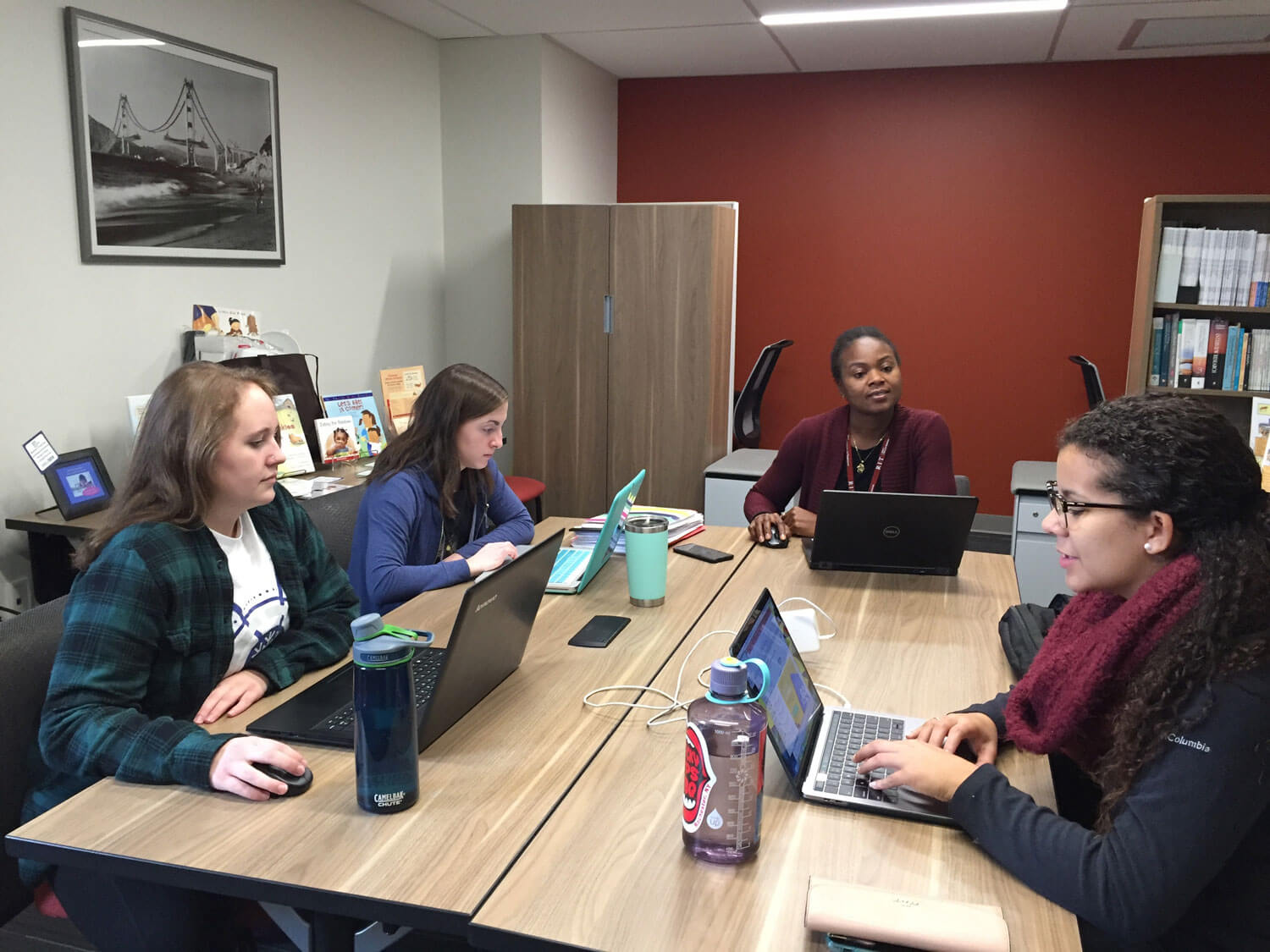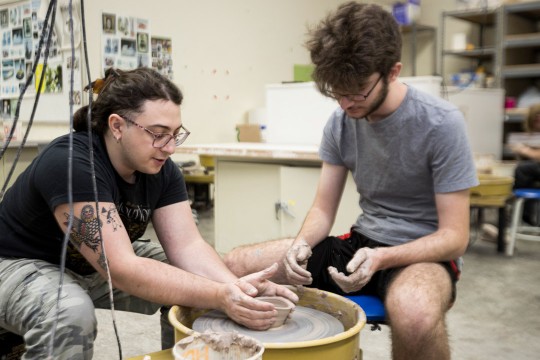Health and Well-Being Management Master of Science Degree

Health and Well-Being Management
Master of Science Degree
- RIT /
- College of Health Sciences and Technology /
- Academics /
- Health and Well-Being Management MS
Design and lead wellness programs that help people live healthier lives while boosting organizational productivity.
Overview for Health and Well-Being Management MS
Choose from two options in: (1) content development, implementation, and evaluation or (2) health and well-being program management.
Individual and community health, disease prevention, and engaging in healthful habits to promote well-being are at the fore-front of public interest. Health and wellness is a mosaic of nutrition, physical activity, stress management, and environmental features that are critical for a productive, efficient, and healthy society. Corporations, small businesses, government agencies, and institutions are employing health and well-being professionals to help people lead healthier lives and contribute to corporate, agency, and business productivity.
RIT’s Health and Wellness Degree
The MS in health and well-being management is a health and wellness degree that prepares you for a career in health and well-being program design, administration, and research. It is the perfect choice for those interested in going to medical or dental school or pursing doctoral studies in nutrition, health promotion, exercise science, or public health.
To provide high-quality, population-based health care, the future health care workforce needs a skill set that includes the ability to:
- apply systems thinking,
- design interventions,
- practice dissemination and implementation science,
- engage with communities, and
- understand and utilize team dynamics, negotiation, and advocacy skills.
RIT's health and wellness degree offers evidence-informed guidance to develop and apply these skills.
Choose From Two Options
The MS in health and well-being management offers two options, both of which prepare you for a career in health and well-being as well as offer research experiences for those interested in pursuing further doctoral and post-graduate studies.
- Content development, implementation, and evaluation focuses on helping students learn how to design and execute health and well-being programs, focusing on development of content and expertise in a particular area of health or wellness, such as exercise, behavior, and nutrition.
- Health and well-being program management relates to leading an organization’s health and wellness program or an employee assistance program within corporate setting or in self-employment venues.
Health and Wellness Degree: Educational Outcomes
- Demonstrate skills in the design, delivery, and evaluation of individual and group interventions/programs that are consistent with evidence based social and behavioral theories.
You will learn health education and program evaluation concepts, examine evidence and research-based content and apply learning behavior theory constructs to health and well-being activities.
- Demonstrate the ability to assist with health, physical, nutrition, behavioral screenings or policy analysis to plan and manage a safe and effective health promotion program for both healthy and health-impaired individuals.
You will acquire a knowledge base in nutrition, physical activity, and health law including screening and assessment and utilize this knowledge in health and well-being dissemination or implementation science activities.
- Develop skills and experience necessary to promote program services to appropriate community recipients including the ability to categorize subsets of the worksite/organization population and identify appropriate intervention strategies for each subset.
You will be able to describe and conduct needs assessments and apply findings appropriately. Also, you will demonstrate the acquisition of marketing concepts to a health and well-being problem.
- Apply the requisite skills to plan and conduct inquiries into problems and outcomes used to develop and manage health and well-being activities, programs and campaigns.
You will apply behavior change theory concepts and research and evaluation criteria to examine, critique, and assess health and well-being programs and activities.
- Collaborate with multiple disciplines to promote and administer health related research, activities, and policy at the organizational, community, state, and federal level.
You will develop verbal and written communication strategies and skills and apply them to tasks involving collaboration, interpretation, and critical thinking for health and well-being activities. Also, be well versed in health and well-being policy development and strategic application at multiple levels of governments and organizations.
- Design and execute a comprehensive project or research-based inquiry relevant to the health promotion industry.
You will integrate your learning in a research, inquiry, or review project on a topic pertinent to designing, planning, implementing, evaluating, managing, or marketing health and well-being.
Careers in Health and Wellness
The health and well-being management program prepares graduates for careers that provide services to enhance employee health and consequent workforce productivity, including:
- Administrator or manager of a health and well-being program/initiative for government, industry, or organizational entities.
- Health and well-being educator/communicator, instructional program designer, developer, or implementer.
- Preparation for future medical and dental education, doctoral training in fields related to nutrition, health promotion, exercise science, and public health.
Learn More
Download our program brochure for more information.
-
Affordable Now. Valuable for Life.
Earn your master’s degree without the full price tag. With Master Up you can receive a 30% tuition scholarship for an RIT master’s degree.
Careers and Cooperative Education
Typical Job Titles
| Director of Wellness | Medical or Ph.D. student | Health Educator |
| Health Research Assistant/Coordinator | Quality Assurance Technician |
Cooperative Education
What makes an RIT education exceptional? It’s the ability to complete relevant, hands-on career experience. At the graduate level, and paired with an advanced degree, cooperative education and internships give you the unparalleled credentials that truly set you apart. Learn more about graduate co-op and how it provides you with the career experience employers look for in their next top hires.
Featured Work and Profiles
-
Student Research Experiences
Undergraduate and graduate students in the Wegmans School of Health and Nutrition gain valuable, hands-on research experience through classroom and community-based opportunities.
Read More about Student Research Experiences -
Nicole Watson, MS
Learn how Nicole Watson, a graduate student in the health and well-being management program, fits graduate school into her already busy schedule.
Read More about Nicole Watson, MS -
Jenna Hickey, MS
“The health and well-being management program has prepared me for a future career in medicine and research.”
Read More about Jenna Hickey, MS -
Olivia Garror, MS
“This program opened so many new doors for me. I was able to learn more about public health, health systems, policy, program development and evaluation, and even a little bit more psychology.”
Read More about Olivia Garror, MS
Curriculum for 2025-2026 for Health and Well-Being Management MS
Current Students: See Curriculum Requirements
Admissions and Financial Aid
This program is available on-campus only.
| Offered | Admit Term(s) | Application Deadline | STEM Designated |
|---|---|---|---|
| Full‑time | Fall | Rolling | No |
| Part‑time | Fall or Spring | Rolling | No |
Full-time study is 9+ semester credit hours. Part-time study is 1‑8 semester credit hours. International students requiring a visa to study at the RIT Rochester campus must study full‑time.
Application Details
To be considered for admission to the Health and Well-Being Management MS program, candidates must fulfill the following requirements:
- Complete an online graduate application.
- Submit copies of official transcript(s) (in English) of all previously completed undergraduate and graduate course work, including any transfer credit earned.
- Hold a baccalaureate degree (or US equivalent) from an accredited university or college. A minimum cumulative GPA of 3.0 (or equivalent) is recommended.
- Satisfy prerequisite requirements and/or complete bridge courses prior to starting program coursework.
- Submit a current resume or curriculum vitae.
- Submit a personal statement of educational objectives.
- Submit two letters of recommendation.
- Entrance exam requirements: None
- Submit English language test scores (TOEFL, IELTS, PTE Academic, etc.), if required. Details are below.
English Language Test Scores
International applicants whose native language is not English must submit one of the following official English language test scores. Some international applicants may be considered for an English test requirement waiver.
Duolingo (DET): 120
IELTS: 6.5
LanguageCert Academic: 70
PTE Academic: 56
TOEFL: 79/4.5
International students below the minimum requirement may be considered for conditional admission. Deaf and hard-of-hearing test takers with significant hearing loss do not need to take the listening and speaking sections for the TOEFL and IELTS. Each program requires balanced sub-scores when determining an applicant’s need for additional English language courses.
How to Apply Start or Manage Your Application
Cost and Financial Aid
An RIT graduate degree is an investment with lifelong returns. Graduate tuition varies by degree, the number of credits taken per semester, and delivery method. View the general cost of attendance or estimate the cost of your graduate degree.
A combination of sources can help fund your graduate degree. Learn how to fund your degree
Additional Information
Prerequisites
Applicants must have completed an accredited college-level nutrition course with a B or better.
Accreditation
Facilities
-
 Nutrition Assessment Lab
Nutrition Assessment LabThe Nutrition Assessment Lab is dedicated to evaluating and improving nutritional health through cutting-edge tools and evidence-based methods.
Related News
-
February 6, 2026

ArtEx students find community by leaning into creativity
ArtEx creates opportunities for students outside of RIT’s College of Art and Design to participate in creative and collaborative experiences by granting special access to engage with the studios, resources, and expertise available within the School for American Crafts and School of Art.
-
May 10, 2023

RIT and URMC researchers study maternal nutrition and oral health for clues to childhood tooth decay
Researchers from RIT and the University of Rochester Medical Center are taking a closer look at nutritional factors during pregnancy and in infancy associated with severe tooth decay in young children.
-
April 25, 2023

RIT graduate programs rank among best in nation in ‘U.S. News & World Report’ 2023 survey
RIT graduate degree programs are among the best in the nation, according to the U.S. News & World Report annual statistical survey of graduate programs.
Contact
- Karen Palmer
- Interim Director of Graduate Admissions
- Office of Graduate Admissions
- Enrollment Management
- 585‑475‑5656
- kbpges@rit.edu
- Barbara Lohse
- Professor, Dietetics and Nutrition
- Dean’s Office
- College of Health Sciences and Technology
- 814‑880‑9977
- balihst@rit.edu
Wegmans School of Health and Nutrition









